Mysteries make good reading. Some are perfect for an afternoon at the beach, and some challenge your logical expertise. A third group absorbs you thoroughly, solving the mystery by a slow unraveling of the characters’ inner life. For me, this is the group that is memorable, for they open new areas of the human soul. A good many mainstream novels that are driven by unanswered question (what good book isn’t?) might be included in this category, but for convenience I’ll limit it to those that explore violent death. Here are a couple of masterfully done by Thomas Cook, a suspense writer who has won about every award .
The story opens with Julian Wells’ suicide. The act is inexplicable to his best friend Phillip Anders, for Wells was a successful crime writer at the height of his career. Even more baffling is the dedication in Wells’ book: “For Phillip who is the sole witness to my crime.” The search for an answer starts with scant evidence—a change in Julian’s mood after returning from Argentina and Phillip’s memories of that trip—and follows Julian’s path through the crime scenes Wells sought out for his books. The path, a slow turning whirlpool, circles back to its vortex in Argentina, where his friend was transformed from an exuberant, life-loving, brilliant author into a doomed specter of himself. The answer, when it comes, settles in slowly and spreads. This is truly the exploration of a soul.
Sam Madison is on trial for the murder of his wife, Sandrine. As the prosecution unfolds the details of her death and the evidence against him, Sam relives their marriage. From the awkward doctoral student blown away by the love of the beautiful Sandrine, to their lives as professors at a small college and the brilliant rise of Sandrine as a Cleopatra scholar, to his own failure to write the novel that was his life’s ambition. Sam’s character emerges alongside the courtroom scene and the cleverness of his lawyer in casting doubt on each witness that takes the stand. It is the story of a man’s slow confrontation with himself. Whether he committed the crime and whether the jury convicted him, I’ll leave to the reader to discover.



Comments are closed.